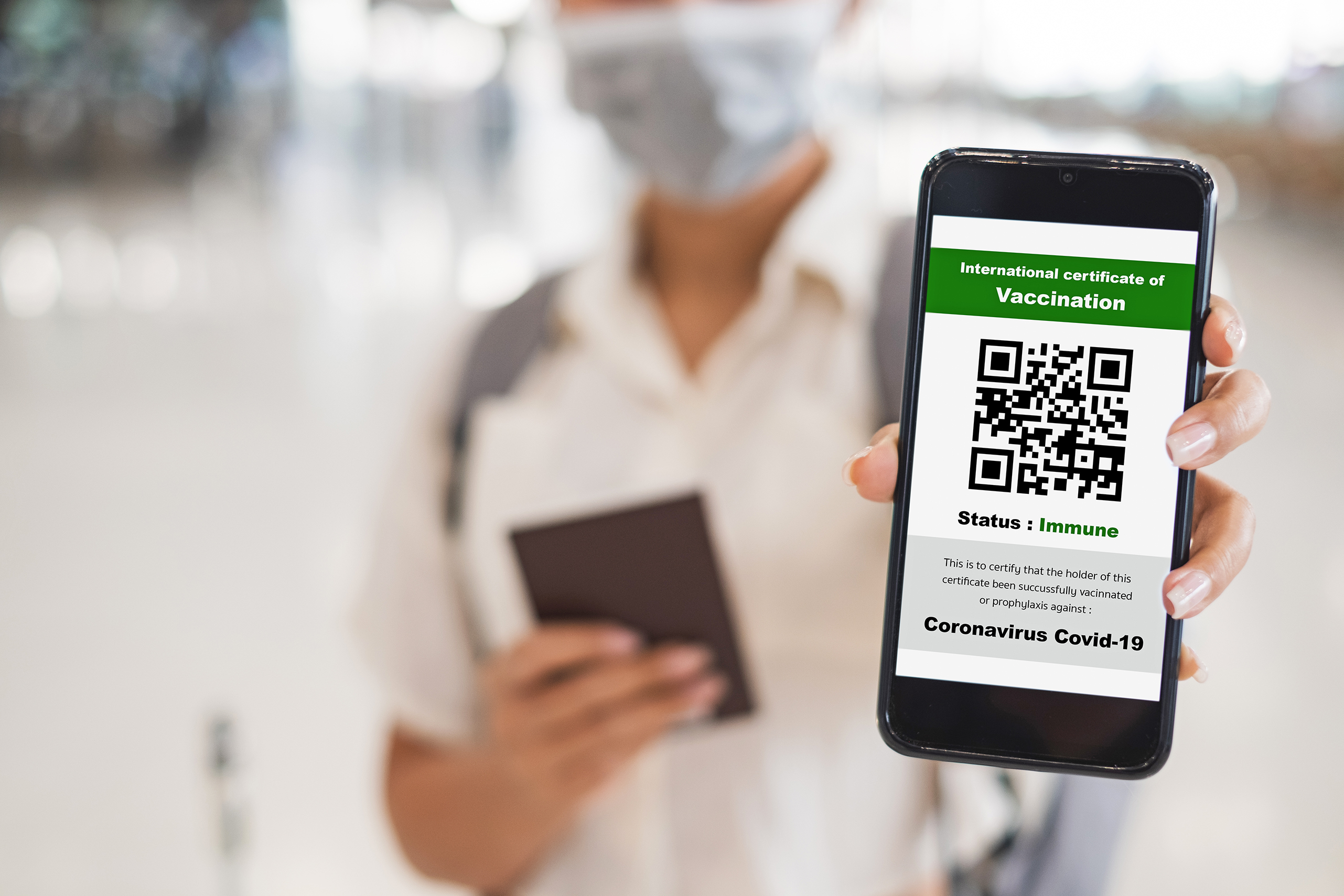Foreign Citizens Face Difficulties Getting Immunization Cards

Image is illustrative only.
Photo by Nattakorn_Maneerat / Shutterstock.com
As Hungary’s vaccination rollout progresses and the number of jabs given increases, the government plans to ease virus curbs further, according to Gergely Gulyás, head of the Prime Minister’s Office. But foreigners legally living in the country have faced problems securing the immunization certificates that would enable them to benefit.
Speaking at the government’s weekly press briefing held on Thursday, May 13, Gulyás announced the loosening of several more lockdown restrictions. As of May 28, people can organize wedding receptions, larger funerals will be authorized, and summer camps for children will open from mid-June after reaching a certain level in vaccination.
Thanks to its mass vaccination campaign, the government hopes to have administered at least five million first doses of the coronavirus vaccines by the end of May, inoculating 50% of the population, Gulyás said.
Outdoor terraces reopened in Hungary some four weeks ago. According to latest regulations, indoor dining, museums, thermal spas, hotels, theaters, cinemas, gyms, libraries, and many other recreational venues will open gradually. These facilities, however, will be available only for those individuals in possession of a government-issued immunity card.
However, the latest reopening measures resulted in complaints from many non-Hungarian legal residents, as they are facing difficulties in receiving the plastic cards. The confusion was not helped by some mixed messages from the authorities.
Initially, foreign nationals were told to contact their general practitioners at the vaccination point where they received their shots and tell them that they do not have Hungarian citizenship. This would require doctors to delete the original vaccination records and create a new one, making the process even longer. At the same time, it was not clear to doctors that they needed to register foreign citizens with any distinctive identification marks.
The German Embassy confirmed to the Budapest Business Journal that “a large number of inquiries” had been made about the cards by German nationals living in Hungary. It added, “For questions regarding the immunity card, we recommend that our compatriots visit the government’s website (www.kormanyablak.hu).”
Seeking Clarification
The British Embassy said it, too, was “aware that vaccinated foreign, including U.K., nationals legally resident in Hungary have not been receiving their immunity certificate. We have been seeking clarification and advice from the Hungarian authorities, including the Ministry of Foreign Affairs and the Chief Medical Officer. We will continue to do so.”
The spokesperson added: “We have been informed that all people vaccinated in Hungary should receive their Immunity Certificates. Budapest Főváros Kormányhivatala has informed us that people who have yet to receive their certificate should make inquiries at their local government office (Kormányablak) either in person or online.
“If this does not resolve problems, they should contact the GP who arranged their vaccination and check whether their personal and contact details were registered in the EESZT system (Elektronikus Egészségügyi Szolgáltatási Tér or Electronic Health Services Area). We have been told that the lack of contact details in the EESZT system might cause delays in issuing immunity certificates, regardless of nationality.”
The U.S. Embassy said that it “routinely address concerns of the community with relevant government offices, such as asking for clarification on how U.S. citizens residing in Hungary would fit into Hungary’s vaccine rollout, including proof of immunization.”
It noted: “The Hungarian government on https://vakcinainfo.gov.hu has recommended that individuals having trouble with receiving their immunization card first verify that their vaccine has been registered. If the vaccine has been registered, but the immunization card has not been received, the instructions on the website are to report the problem through the portal, or at http://magyarorszag.hu.”
According to Gulyás, the problem is caused by a technical complication in the electronic healthcare system managing the registration of vaccinations and the issuance of immunity cards. Individuals registering for the vaccination must provide an ID card or passport number together with a local social security number (TAJ).
However, the system cannot handle foreign ID cards or passport numbers and cannot link them to the TAJ numbers; thus, it cannot produce the cards for legal, vaccinated, non-Hungarian residents. Many of their Hungarian peers got their cards within eight days of their first shot.
The BBJ contacted Központi Okmányiroda, the issuer of immunization cards, requesting further information. At first, it said there was no problem, and both Hungarians and non-Hungarians were getting the card.
When told that was not the case, the issuer said anyone facing such problems should report it to the relevant government offices with documents verifying that their shots have been administered and registered, and they will receive their immunization certificate in the mail shortly after the visit. It is also possible to report the problem online at the website of http://magyarorszag.hu. Központi Okmányiroda said that there is now no need for a prior office appointment in the case of personal visits.
Working on a Solution
The Ministry of Interior, the Cabinet Office of the Prime Minister, the Prime Minister’s Office are jointly working on a solution to eliminate the problem and facilitate access to plastic cards, Gulyás said. He added that foreign citizens would also be able to pick their cards up personally at government offices; there will be no need to wait for them in the mail.
On May 14, the government also launched a mobile application that serves as a COVID immunity certificate. The app, available for Android and iOS, is operating in test mode at present, and it requires prior registration on the www.eeszt.gov.hu website.
Based on a QR code, the app tracks information on the date of all vaccinations (not just for the coronavirus), contains the name and TAJ number of its holder and specifies the disease the vaccination prevents.
The BBJ contacted several indoor venues to ask if they would accept the mobile application as proof of immunization. The biggest gyms and thermal spas already have a QR code reader system and said that visitors using only the smartphone app would be granted entry, but they should also bring their ID card or passport with them.
Some libraries told us that visitors using the app could enter the building, but others do not yet have protocols in place for this. Restaurants show a scattered picture, most waiting for more detailed information on relevant regulations.
Meanwhile, the Office of the Commissioner for Fundamental Rights has expressed concerns about the use of the vaccination cards, saying that it raises several constitutional questions. Ombudsman Ákos Kozma has received more than 800 complaints during the last few days, which led him to submit a proposal to the Ministry of Interior and the Ministry of Human Capacities, which control of the Operative Board, the body responsible for handling the coronavirus epidemic in Hungary.
This article was first published in the Budapest Business Journal print issue of May 21, 2021.
SUPPORT THE BUDAPEST BUSINESS JOURNAL
Producing journalism that is worthy of the name is a costly business. For 27 years, the publishers, editors and reporters of the Budapest Business Journal have striven to bring you business news that works, information that you can trust, that is factual, accurate and presented without fear or favor.
Newspaper organizations across the globe have struggled to find a business model that allows them to continue to excel, without compromising their ability to perform. Most recently, some have experimented with the idea of involving their most important stakeholders, their readers.
We would like to offer that same opportunity to our readers. We would like to invite you to help us deliver the quality business journalism you require. Hit our Support the BBJ button and you can choose the how much and how often you send us your contributions.







